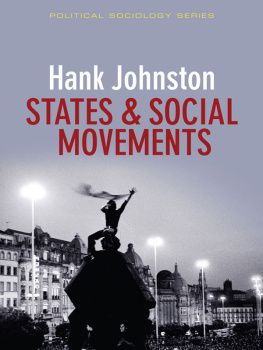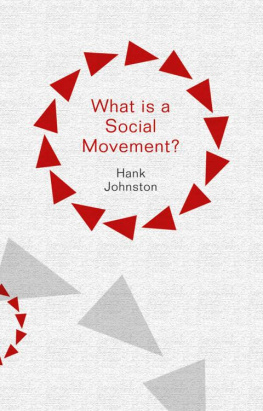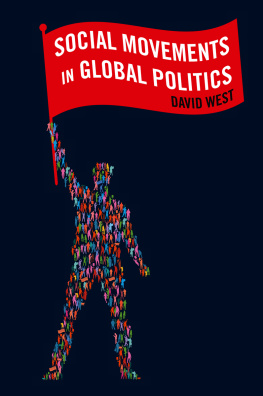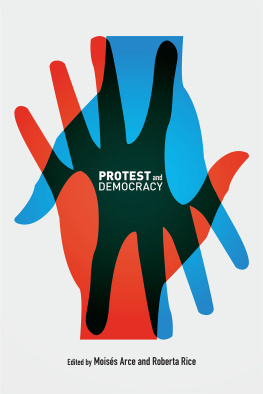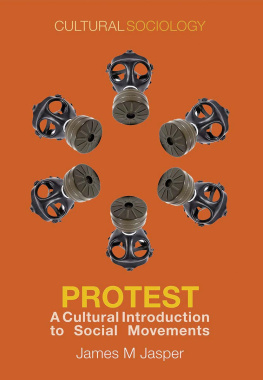States and Social Movements
Political Sociology series
Daniel Bland, What is Social Policy?
Understanding the Welfare State
Hank Johnston, States and Social Movements
Richard Lachmann, States and Power
States and Social Movements
Hank Johnston
polity
Copyright Hank Johnston 2011
The right of Hank Johnston to be identified as Author of this Work has been asserted in accordance with the UK Copyright, Designs and Patents Act 1988.
First published in 2011 by Polity Press
Polity Press
65 Bridge Street
Cambridge CB2 1UR, UK
Polity Press
350 Main Street
Malden, MA 02148, USA
All rights reserved. Except for the quotation of short passages for the purpose of criticism and review, no part of this publication may be reproduced, stored in a retrieval system, or transmitted, in any form or by any means, electronic, mechanical, photocopying, recording or otherwise, without the prior permission of the publisher.
ISBN-13: 978-0-7456-5911-4
A catalogue record for this book is available from the British Library.
Typeset in 11 on 13 pt Sabon
by Servis Filmsetting Ltd, Stockport, Cheshire
Printed and bound by MPG Books Group, UK
The publisher has used its best endeavours to ensure that the URLs for external websites referred to in this book are correct and active at the time of going to press. However, the publisher has no responsibility for the websites and can make no guarantee that a site will remain live or that the content is or will remain appropriate.
Every effort has been made to trace all copyright holders, but if any have been inadvertently overlooked the publisher will be pleased to include any necessary credits in any subsequent reprint or edition.
For further information on Polity, visit our website: www.politybooks.com
List of Illustrations
The State, Protest, and Social Movements
Social movements and protests occur within state systems. Their targets are usually state authorities who are in positions to make changes and reforms that answer protesters demands. While it is possible that protesters sometimes challenge nonstate institutions, such as university administrations or religious organizations, in the twenty-first century, the vast majority of protest campaigns and social movements target the state, which is the main justification for this book. Indeed, social movements and protests have become so common today that they are considered by most social scientists who study them as a regular part of politics contentious politics is the term that is widely used. Nowadays, people rely not only on political parties and elections to make their preferences known, but also on protests, demonstrations, petitions campaigns, marches, and organizations that pursue their demands for social change. These are all important vehicles for how interests are asserted and defended in contemporary politics. This is the main theme that I will develop in these pages, that social movements are politics by another means peoples politics, not elite politics.
The starting place to trace the relationship between protest and state is the emergence of the modern institutions of governance, a process that began over two centuries ago, roughly in the mid-eighteenth century. The structure of the eighteenth-century state was very different from the complex, bureaucratized modern states that we take for granted in the twenty-first century. Today, the state touches many aspects of our daily lives, from collecting taxes to regulating the economy, who can marry, and what is in school textbooks. Moreover, modern democratic states are based on the presumption of responsiveness of elected officials to those they govern. All this provides fodder for a broad range of claims against the state and sets the stage for popular pressures through both institutional channels (party politics) and noninstitutional ones (protest and social movements). The premodern state, in contrast, touched peoples lives only occasionally. Life was mostly village-based and rural, and protests infrequently erupted when traditional obligations were broken or conditions became intolerable. Part of becoming modern was the states growth and extension so that it affected peoples lives more regularly and more broadly. In this chapter I will briefly trace how the modern state developed from premodern autocratic monarchies based on tradition and the interests of the landed elite, and more central to the theme of this book how this transition occurred in tandem with the emergence of the modern social movement. The bottom line is that we cannot fully understand the shape of the modern state without considering the role of social movements and protest.
When we look back to the autocratic agrarian states of the premodern period, for example Henry Vs Kingdom of England (14131422), we encounter state elites King Henry, the Duke of Gloucester, the Duke of Bedford, and other nobility who took the right to rule for granted and were not remotely democratic in their relations with their subjects. They drew upon power and wealth based on traditions and land ownership to enforce their rule, often with impunity. The idea of rulers being responsive to those they ruled developed alongside the modern state and, in part, was put into practice in democratic governance through pressures from those classes outside the landed nobility. This means that a good part of state development occurs on the fault line between the actions of the rich and powerful to preserve their privileges and those classes seeking greater say in how they are governed.
In this chapter I will develop the theme that a complete history of the modern state must consider the actions of the popular classes that, from time to time, exerted pressure on state elites through collective violence, insurrections, protests, and social movements. Against elite interests, popular interests are given form and substance by collective action. Throughout the centuries, state elites have kept an eye on those they rule, whether they be the slaves of the fourteenth-century Inca Empire (only infrequently), rural peasants of seventeenth-century France (perhaps more often), or angry taxpayers in twenty-first century North America (frequently). But let us be clear: for most of history, when a rulers attention turned to the common folk, it was usually not from compassion or concern for their well-being or a desire to protect their interests, but for practical considerations of maintaining power and squelching the threat of rebellion. The long-term effects of popular mobilizations and protests have been to force the ruling classes slowly at first and more consistently in recent times to consider the popular will in state politics.
This chapter will outline the development of the modern state, its basic contours, and how popular collective mobilizations were an important force in keeping state elites open to the claims of ordinary citizens. Historically, they brought new elites who were more responsive at least to their particular constituency into the state system, thereby institutionalizing changes that made the state more accessible to ever-widening circles. Although this is usually not the intended consequence of social movements, to this day they continue to bring new challenging groups, new ideas, new coalitions, and new interests into todays system, such that the strong undemocratic tendencies are often mitigated to the extent that social movements mobilize.
The emergence of the modern state
What exactly is the state? In intellectual history, the state has often been approached from an abstract, philosophical perspective that asks questions about its ideal form, its essence, and why it exists at all. Some of the most influential thinking along these lines occurred during the Enlightenment, a Western intellectual movement that roughly spanned the eighteenth century. This was when the seeds of the modern state were just budding, and Enlightenment ideas provided the food and water for the early sprouts. Central among them was the idea that the state was a contract entered into by members of society. Thomas Hobbes (15881679), for example, proposed that individuals naturally sought their own interests, and it was the contractual provision of the state that prevented war of all against all. Jean-Jacques Rousseau (17121778) saw the state as the basis of the common good of its members. In his treatise,
Next page
